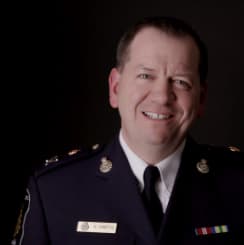Our community engagement efforts take many forms, as detailed in the Sustainability Approach and Performance section of this annual report. We conduct regular public opinion and key influencer surveys to better understand attitudes toward Toronto Pearson and gain insights that inform our programs.
In 2019, we introduced a new public learning program to strengthen our connections with area residents and share information on how our airport operates.
In 2019, we introduced a new public learning program to strengthen our connections with area residents and share information on how our airport operates. Close to 400 people attended our 10 open houses across the Greater Toronto Area, expanding their knowledge of runways, flight paths and how planes fly, as well as discussing sustainability-related topics such as noise management, environmental programs, Toronto Pearson’s economic impact and our vision for integrated regional transit.
 Events, town halls and meetings strengthen our connections with area residents.
Events, town halls and meetings strengthen our connections with area residents.
Noise management forums
Even as aircraft grow increasingly quieter, thanks to continuing advances in modern engineering, all major global airports run specialized noise management programs to offset and reduce the impact of their routine operations. Toronto Pearson’s 2018–2022 Noise Management Action Plan serves as our roadmap in this area, setting out a range of ambitious programs based on the 10 fundamental commitments we’ve made to nearby communities.
For more than 20 years, the Community Environment and Noise Advisory Committee (CENAC) provided regular opportunities for local residents and elected representatives to discuss and ask questions about aircraft noise and other environmental issues. In early 2019, as part of the Action Plan, we introduced a new platform: the Noise Management Forums, which offer a more inclusive and productive approach to encouraging open conversations with our neighbours, stakeholders and partners.
The Noise Management Forums are a suite of briefings, discussion tables and working groups designed to help us work smarter with our communities and collaborate better with industry partners. By the end of the forums’ inaugural year, there was broad consensus that they have transformed how we work with our neighbours to build mutual understanding and drive impact.
The Noise Accountability Board (NAB)
An industry working group that helps set the strategic direction of noise management at Pearson. Members include representatives from the GTAA, NAV Canada, airlines, Transport Canada, provincial government bodies, and regional and municipal planning departments.
The Neighbourhood Table
A forum where the NAB can connect with a range of stakeholders, including residents’ and ratepayers’ associations, and community groups with deep knowledge of or interest in airport operations. We held three of these sleeves-up sessions in 2019, each attracting about 30 people. In addition, Neighbourhood Table sub-committees provide valuable input as we develop regular noise reports (slated for launch in 2020), along with an interactive web portal offering personalized information about airport operations and impacts.
Pearson Public Meetings
Where the broader community can learn more about airport operations and what we're doing to manage noise impacts, and where they can also offer their feedback to our industry partners.
Political briefings
Providing representatives from all levels of government with the details they need on how we’re managing noise and working with our communities.
Information and background materials from these various events are posted on our Noise Management website and made available to all interested parties.
Six ideas to reduce noise
The Six Ideas: A Quieter Operations Roadmap is a joint initiative between the GTAA and NAV Canada exploring mitigation options to help reduce noise impacts in our neighbouring communities. Ideas 1 through 4, led by NAV Canada, focused on how aircraft approach and depart our airport. Ideas 5 and 6, led by the GTAA, are examining how runways are used by aircraft flying into and out of Toronto Pearson.
In 2019, we ran a 16-week trial of the Summer Weekend Runway Alternation Program, which was designed to vary noise impacts by rotating runway usage during periods when fewer aircraft are arriving and departing. The feedback we received during and after the trial indicated a lack of community support for the program. Of the survey respondents who expressed a point of view, 64 per cent either had a negative experience or said they didn’t notice any difference. As a result, we’ve decided against pursuing the program and instead are planning a one-year trial of an updated preferential runway system for nighttime flights.
 In 2019, we ran a 16-week trial of the Summer Weekend Runway Alternation Program.
In 2019, we ran a 16-week trial of the Summer Weekend Runway Alternation Program.
Toronto Pearson has implemented a program offering incentives to airlines that retrofit the engines of the Airbus A320 family of aircraft, which are known to produce a high-pitched whining sound on approach. Having advised airlines of our plans in 2017, we conducted an audit in 2019 to find out how far along they were in retrofitting or replacing the A320 aircraft in their fleets. The findings were encouraging; we believe that retrofitted aircraft will account for 90 per cent of A320 flights at Toronto Pearson by 2022. Starting in 2020, we’ll be monitoring airlines’ retrofit progress on a quarterly basis and sharing the results through our Noise Management Forums.








